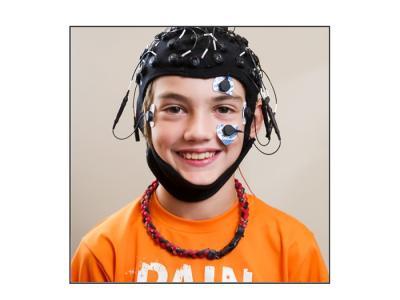Physical Fitness Results in Better Language Skills in Children
Author: University of Illinois at Urbana-Champaign
Published: 2014/06/06 - Updated: 2014/11/03
Category Topic: Cognitive - Related Publications
Page Content: Synopsis - Introduction - Main
Synopsis: Researchers report children who are physically fit have faster and more robust neuro-electrical brain responses during reading than their less-fit peers.
Introduction
These differences correspond with better language skills in the children who are more fit, and occur whether they're reading straightforward sentences or sentences that contain errors of grammar or syntax.
Main Content
The new findings, reported in the journal Brain and Cognition , do not prove that higher fitness directly influences the changes seen in the electrical activity of the brain, the researchers say, but offer a potential mechanism to explain why fitness correlates so closely with better cognitive performance on a variety of tasks.
"All we know is there is something different about higher and lower fit kids," said University of Illinois kinesiology and community health professor Charles Hillman, who led the research with graduate student Mark Scudder and psychology professor Kara Federmeier. "Now whether that difference is caused by fitness or maybe some third variable that (affects) both fitness and language processing, we don't know yet."

The researchers used electroencephalography (EEG), placing an electrode cap on the scalp to capture some of the electrical impulses associated with brain activity. The squiggly readouts from the electrodes look like seismic readings captured during an earthquake, and characteristic wave patterns are associated with different tasks.
These patterns are called "event-related potentials" (ERPs), and vary according to the person being evaluated and the nature of the stimulus, Scudder said.
For example, if you hear or read a word in a sentence that makes sense ("You wear shoes on your feet"), the component of the brain waveform known as the N400 is less pronounced than if you read a sentence in which the word no longer makes sense ("At school we sing shoes and dance," for example), Scudder said.
"We focused on the N400 because it is associated with the processing of the meaning of a word," he said. "And then we also looked at another ERP, the P600, which is associated with the grammatical rules of a sentence." Federmeier, a study co-author, is an expert in the neurobiological basis of language. Her work inspired the new analysis.
The researchers found that children who were more fit (as measured by oxygen uptake during exercise) had higher amplitude N400 and P600 waves than their less-fit peers when reading normal or nonsensical sentences. The N400 also had shorter latency in children who were more fit, suggesting that they processed the same information more quickly than their peers.
Most importantly, the researchers said, these differences in brain activity corresponded to better reading performance and language comprehension in the children who were more fit.

"Previous reports have shown that greater N400 amplitude is seen in higher-ability readers," Scudder said.
"Our study shows that the brain function of higher fit kids is different, in the sense that they appear to be able to better allocate resources in the brain towards aspects of cognition that support reading comprehension," Hillman said.
More work must be done to tease out the causes of improved cognition in kids who are more fit, Hillman said, but the new findings add to a growing body of research that finds strong links between fitness and healthy brain function.
Many studies conducted in the last decade, on children and older adults, "have repeatedly demonstrated an effect of increases in either physical activity in one's lifestyle or improvements in aerobic fitness, and the implications of those health behaviors for brain structure, brain function and cognitive performance," Hillman said.
The National Institute of Child Health and Human Development at the National Institutes of Health supported this research.
The paper, "The Association Between Aerobic Fitness and Language Processing in Children: Implications for Academic Achievement," is available online or from the U. of I. News Bureau.